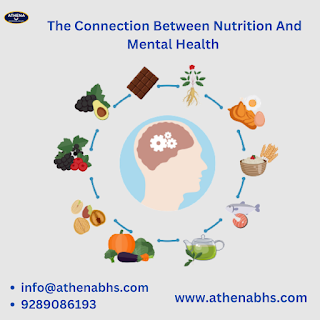It is well-known that our diet has a significant impact on our physical health, but it can also play a role in managing our mental health. In the past few years, there is a growing awareness of the connection between nutrition and mental health. Several studies conducted by experts across the globe have shown that the nutrients we consume can affect our mood, cognition, and behavior and that dietary changes can have a positive impact on mental health conditions such as depression and anxiety.
There are several ways in which nutrition can affect an individual’s mental health:
1. Regulation of neurotransmitters: One of the key ways that nutrition affects mental health is through the regulation of neurotransmitters. Neurotransmitters are chemical messengers in the brain that help to regulate our mood, cognition, and behavior. They are produced from amino acids, which are found in protein-rich foods. Therefore, a diet that is low in protein can result in a deficiency of neurotransmitters, leading to mental health issues.
Some of the key neurotransmitters that are affected by nutrition include serotonin, dopamine, and GABA. Serotonin is known as the "feel-good" neurotransmitter, and low levels have been linked to depression and anxiety. The amino acid tryptophan, which is found in protein-rich foods such as chicken, turkey, and fish, is a precursor to serotonin. Therefore, consuming foods that are high in tryptophan can help to boost serotonin levels.
Dopamine is another neurotransmitter that is affected by nutrition. Dopamine is involved in reward and motivation, and low levels have been linked to depression and addiction. The amino acid tyrosine, which is found in protein-rich foods such as eggs, dairy, and meat, is a precursor to dopamine. Therefore, consuming foods that are high in tyrosine can help to boost dopamine levels.
GABA is a neurotransmitter that is involved in relaxation and stress reduction. Low levels of GABA have been linked to anxiety and depression. The amino acid glutamine, which is found in protein-rich foods such as beef, chicken, and fish, is a precursor to GABA. Therefore, consuming foods that are high in glutamine can help to boost GABA levels.
2. Structure and function of the brain: The brain is made up of cells called neurons, which communicate with each other through connections called synapses. These synapses are made up of proteins, which are produced from amino acids found in protein-rich foods. Therefore, consuming a diet that is low in protein can result in a deficiency of these proteins, which can affect the structure and function of the brain.
3. Inflammation: Inflammation is a normal immune response that occurs when the body is under stress or threat. However, chronic inflammation can lead to a range of physical and mental health problems, including depression, anxiety, and Alzheimer's disease. Consuming a diet that is high in anti-inflammatory foods, such as fruits, vegetables, and whole grains, can help to reduce inflammation in the body and improve mental health outcomes.
Road To Recovery
The connection between nutrition and mental health is complex and multifaceted. A diet that is high in protein and nutrients such as omega-3 fatty acids, vitamin D, and B vitamins can help to support optimal mental health outcomes. Additionally, consuming a diet that is low in processed foods and sugar can help to reduce inflammation in the body. In case, there’s someone you know who is dealing with any type of mental health issue, it is best to seek help from one of the best Mental Health Treatment Facilities.
Athena Behavioral Health
is one of the leading providers of Mental Health Treatment Centers in
Gurgaon. It offers the best treatment for various forms of mental illnesses
at the most reasonable cost. Located in the hub of nature with the best
amenities, our facility is one of the best Mental Health Treatment Centers in Gurgaon
that has a team of experienced psychologists to assure your speedy
recovery. Based on your condition, the treatment plan offered by our experts
can be a mix of medications, therapies, and other required provisions. If you
know someone who is looking for such a facility or is dealing with depression,
anxiety, or any form of mental illness, call us today at 9289086193 You can also drop us an email at
info@athenabhs.com





No comments:
Post a Comment
If you have any doughts. Please let me know